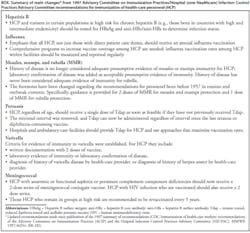Report updates recommendations for vaccinating health-care personnel; drug approved to treat head and neck cancer
By Maria Perno Goldie, RDH, MS
Immunization of Health-Care Personnel: Recommendations of the Advisory Committee on Immunization Practices (ACIP)This new report updates the previously published summary of recommendations for vaccinating health-care personnel (HCP) inthe United States (CDC. Immunization of health-care workers: recommendations of the Advisory Committee on Immunization Practices [ACIP] and the Hospital Infection Control Practices Advisory Committee [HICPAC]. MMWR 1997;46[No. RR-18]).
Immunization of Health-Care Personnel: Recommendations of the Advisory Committee on Immunization Practices (ACIP)This new report updates the previously published summary of recommendations for vaccinating health-care personnel (HCP) inthe United States (CDC. Immunization of health-care workers: recommendations of the Advisory Committee on Immunization Practices [ACIP] and the Hospital Infection Control Practices Advisory Committee [HICPAC]. MMWR 1997;46[No. RR-18]).
This report was reviewed by and includes input from the Healthcare (formerly Hospital) Infection Control Practices Advisory Committee. These updated recommendations can assist hospital administrators, infection-control practitioners, employee health clinicians, and HCP in optimizing infection prevention and control programs. The recommendations for vaccinating HCP are presented by disease in two categories: 1) those diseases for which vaccination or documentation of immunity is recommended because of risks to HCP in their work settings for acquiring disease or transmitting to patients and 2) those for which vaccination might be indicated in certain circumstances.
Background information for each vaccine-preventable disease and specific recommendations for use of each vaccine are presented. Certain infection-control measures that relate to vaccination also are included in this report. In addition, ACIP recommendations for the remaining vaccines that are recommended for certain or all adults are summarized, as are considerations for catch-up and travel vaccinations and for work restrictions. This report summarizes all current ACIP recommendations for vaccination of HCP and does not contain any new recommendations or policies. The recommendations provided in this report apply, but are not limited, to HCP in acute-care hospitals; long-term–care facilities (e.g., nursing homes and skilled nursing facilities); physician’s offices; rehabilitation centers; urgent care centers, and outpatient clinics as well as to persons who provide home health care and emergency medical services.Diseases for Which Vaccination Is Recommended
Reference
The U.S. Department of Health and Human Services (HHS), Centers for Disease Control Prevention (CDC). Recommendations of the Advisory Committee on Immunization Practices (ACIP.)Morbidity and Mortality Weekly Report Recommendations and Reports / Vol. 60 / No. 7 November 25, 2011. Continuing Education Examination available at www.cdc.gov/mmwr/cme/conted.html)FDA approves Erbitux to treat late-stage head and neck cancer
The U.S. Food and Drug Administration recently approved Erbitux (cetuximab) for use with chemotherapy to treat patients with late-stage (metastatic) head and neck cancer.Combined with chemotherapy, Erbitux extended the lives of those receiving the treatment combination compared with those receiving chemotherapy alone. Erbitux already is FDA-approved for certain types of colon cancer, and has been approved since 2006 for treatment of non-metastatic head and neck cancer in combination with radiation therapy (first-line) or as a single agent (following standard treatment).According to the National Cancer Institute (NCI), head and neck cancers account for 3 percent to 5 percent of all cancers in the United States. These cancers typically develop in the nose, throat or mouth. They are more common in men and in people older than 50. The safety and effectiveness of Erbitux for this indication is based on the results of a multi-center clinical study conducted outside the United States involving 442 patients with metastatic or recurrent head and neck cancer. The study used a non-U.S. approved version of cetuximab, rather than the U.S.-approved formulation.Participants had inoperable or widespread disease and had not received prior chemotherapy. Half were selected to receive either the combination of cetuximab with chemotherapy (cisplatin or carboplatin and 5-fluorouracil) or chemotherapy (cisplatin or carboplatin and 5-fluorouracil) only. Patients receiving the cetuximab with chemotherapy combination lived, on average, 10.1 months compared with 7.4 months for those receiving chemotherapy only.The most common side effects reported in patients receiving cetuximab were rash, itching (pruritus), nail changes, headache, diarrhea, and respiratory, skin, and mouth infections. Erbitux also can cause low serum magnesium, potassium, and calcium. Erbitux has been associated with serious and potentially life-threatening infusion reactions and heart attack. Patients taking Erbitux should limit their exposure to the sun.The conclusion was that, as compared with platinum-based chemotherapy plus fluorouracil alone, cetuximab plus platinum–fluorouracil chemotherapy improved overall survival when given as first-line treatment in patients with recurrent or metastatic squamous-cell carcinoma of the head and neck. (ClinicalTrials.gov number, NCT00122460.)References
1. VermorkenJB, Mesia R, Rivera F, Remenar E, Kawecki A, Rottey S, Erfan J, Zabolotnyy D, Kienzer HR, Cupissol D, Peyrade F, Benasso M, Vynnychenko I, De Raucourt D, Bokemeyer C, Schueler A, Amellal N, and Hitt R. Platinum-Based Chemotherapy plus Cetuximab in Head and Neck Cancer. N Engl J Med 2008;359:1116-27.2. Codecà Carla, Ferrari Daris, Bertuzzi Cecilia, Broggio Francesca, Crepaldi Francesca, Foa Paolo. (2012) Angiogenesis in Head and Neck Cancer: A Review of the Literature. Journal of Oncology 2012, 1-9.
The U.S. Department of Health and Human Services (HHS), Centers for Disease Control Prevention (CDC). Recommendations of the Advisory Committee on Immunization Practices (ACIP.)Morbidity and Mortality Weekly Report Recommendations and Reports / Vol. 60 / No. 7 November 25, 2011. Continuing Education Examination available at www.cdc.gov/mmwr/cme/conted.html)FDA approves Erbitux to treat late-stage head and neck cancer
The U.S. Food and Drug Administration recently approved Erbitux (cetuximab) for use with chemotherapy to treat patients with late-stage (metastatic) head and neck cancer.Combined with chemotherapy, Erbitux extended the lives of those receiving the treatment combination compared with those receiving chemotherapy alone. Erbitux already is FDA-approved for certain types of colon cancer, and has been approved since 2006 for treatment of non-metastatic head and neck cancer in combination with radiation therapy (first-line) or as a single agent (following standard treatment).According to the National Cancer Institute (NCI), head and neck cancers account for 3 percent to 5 percent of all cancers in the United States. These cancers typically develop in the nose, throat or mouth. They are more common in men and in people older than 50. The safety and effectiveness of Erbitux for this indication is based on the results of a multi-center clinical study conducted outside the United States involving 442 patients with metastatic or recurrent head and neck cancer. The study used a non-U.S. approved version of cetuximab, rather than the U.S.-approved formulation.Participants had inoperable or widespread disease and had not received prior chemotherapy. Half were selected to receive either the combination of cetuximab with chemotherapy (cisplatin or carboplatin and 5-fluorouracil) or chemotherapy (cisplatin or carboplatin and 5-fluorouracil) only. Patients receiving the cetuximab with chemotherapy combination lived, on average, 10.1 months compared with 7.4 months for those receiving chemotherapy only.The most common side effects reported in patients receiving cetuximab were rash, itching (pruritus), nail changes, headache, diarrhea, and respiratory, skin, and mouth infections. Erbitux also can cause low serum magnesium, potassium, and calcium. Erbitux has been associated with serious and potentially life-threatening infusion reactions and heart attack. Patients taking Erbitux should limit their exposure to the sun.The conclusion was that, as compared with platinum-based chemotherapy plus fluorouracil alone, cetuximab plus platinum–fluorouracil chemotherapy improved overall survival when given as first-line treatment in patients with recurrent or metastatic squamous-cell carcinoma of the head and neck. (ClinicalTrials.gov number, NCT00122460.)References
1. VermorkenJB, Mesia R, Rivera F, Remenar E, Kawecki A, Rottey S, Erfan J, Zabolotnyy D, Kienzer HR, Cupissol D, Peyrade F, Benasso M, Vynnychenko I, De Raucourt D, Bokemeyer C, Schueler A, Amellal N, and Hitt R. Platinum-Based Chemotherapy plus Cetuximab in Head and Neck Cancer. N Engl J Med 2008;359:1116-27.2. Codecà Carla, Ferrari Daris, Bertuzzi Cecilia, Broggio Francesca, Crepaldi Francesca, Foa Paolo. (2012) Angiogenesis in Head and Neck Cancer: A Review of the Literature. Journal of Oncology 2012, 1-9.
Maria Perno Goldie, RDH, MS
To read previous articles in RDH eVillage FOCUS from 2011 written by Maria Perno Goldie, go to articles.





